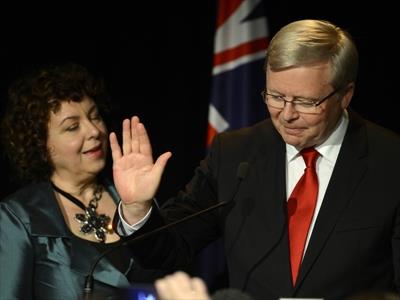FORMER prime minister Kevin Rudd has quit parliament, ending a bitter and divisive three-year chapter in the history of the Labor Party, declaring he bears no malice towards rivals on both sides of the parliamentary chamber.
Mr Rudd was given a standing ovation by MPs as he announced his decision late on Wednesday (AEDT), at the end of the first business day of the new parliament.
He choked back tears and stopped to compose himself several times as he spoke of the heavy toll of politics on his family.
“My family have given their all for me and public life, and for our nation,” an emotional Mr Rudd said, adding it was now time to give something back to them.
“I will not be continuing as a member of parliament beyond this week.”
“It really is time for me to zip,” he said, concluding with one of his key catch phrases.
Mr Rudd led Labor to a sweeping victory over conservative prime minister John Howard in December 2007, but later became embroiled in a damaging leadership feud with his former deputy Julia Gillard, which overwhelmed the party for the past three years.
Ms Gillard defeated Rudd in a leadership showdown in June 2010, and then went on to retain power with minority government in the 2010 election.
But with the Gillard government facing dwindling support in opinion polls, Labor MPs restored Rudd to power in June this year in the hope of heading off an electoral wipeout. Ms Gillard resigned and did not contest the 2013 election.
Rudd cited keeping Australia out of recession following the 2008 global downturn as one of his greatest achievements, saying his government helped Australia avoid mass unemployment while maintaining a AAA credit rating.
His government had introduced a national school curriculum, the first ever paid parental leave scheme and a pension increase.
But it was the official apology to indigenous Australians in 2008 that remained the highlight of his political career.
“Nothing has brought me greater joy in political life than the smiles I have seen on the faces of our Aboriginal brothers and sisters, young and old, country and city, as a result of the apology,” he said.
“I hope though that what we’ve achieved through some healing of the soul will be the first step, the second of course is closing the gap to achieve a healing of broken bodies as well.”
Prime Minister Tony Abbott agreed. He said ancient wrongs were addressed on the day of the National Apology.
“It was a great moment in our country’s history and it happened because of him,” Mr Abbott said.
Despite the infighting which saw many of his Labor colleagues openly criticise his style and personality, Rudd said he had no ongoing grudges.
“I bear no-one in this place any malice. Life is far too short for that. It is time however, for the baton to be passed to others.”
He thanked his family and wife of 32 years, Therese Rein, and asked for privacy once he’s no longer a public figure.
“I’m not planning on any interviews any time soon,” he said.
Mr Abbott, who defeated Rudd at the September 7 election, praised the former prime minister for his contribution to national affairs.
“As a political opponent, but as someone who has known the member for Griffith quite well for a long time, I salute him and I wish him and his family all the best for the future,” Mr Abbott said, adding his 2007 election win was a major moment in Australian history.
“It takes extraordinary ability, insight, guts and focus to win such a contest. He didn’t just win that contest in 2007, he triumphed.
“We must pay tribute to someone of such stature who was able to vanquish in fair political fight someone of at least equal stature.”
Opposition leader Bill Shorten, whose decision to back Rudd ensured his brief return to the prime ministership, said Rudd could leave parliament with his head held high.
Mr Shorten attributed Australia’s success in winning a seat on the United Nations Security Council largely to his distinction on the world stage.
He said Rudd led Labor during a difficult time, and his return to the prime ministership before the September election had improved the ALP’s fortunes.
“This is a tumultuous era in Labor, and with the member for Griffith’s resignation tonight, part of it comes to a close,” Mr Shorten said.
“I do not believe that we will see his like again in the Australian parliament.”
By James Grubel (AAP)













